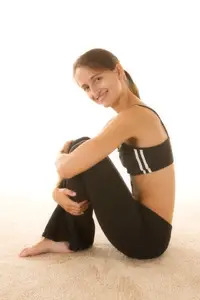My own introduction to Aunt Flo, as many of we women none-too-affectionately refer to our periods, couldn’t have been worse. She arrived rather conspicuously — in the form of a bright-red stain on the back of my white Lee painter pants as I headed to biology class. A whisper from a senior alerted me to my dilemma — and I slunk home to soak my pants in cold water and curse my now-apparent-to-all womanhood.

My hostility toward Aunt Flo has rarely abated and I viewed three pregnancies as a welcome reprieve. I eagerly anticipate menopause for the same reason. For the time being, however, I’m stuck dealing with Aunt Flo in as earth-friendly a manner as possible.
While feminine hygiene rates quite low on our list of eco-sins, it’s worth considering…considering there are options. And I’m not referring to menstrual huts, which — appealing as it may be to remove yourself from everyone who pisses you off during that time of the month — aren’t the most practical option for someone who has to hold down a job, raise children, and otherwise function as a fully present member of society.
So let’s see what else is out there . . .
Organic all-cotton tampons
I came of age around the time women getting toxic shock syndrome was front-page news, so I confess a bias against tampons that I’ve never really been able to shake no matter how enticing the ads depicting girls in white pants horseback riding along a beach (Who does this? Really?). Still, I rely on them at the beach (and the rare times I wear thong underwear because the thought of panty lines is worse than the thought of panties up my butt all night).
If tampons are your stopper of choice, then you need to know this: The chlorine bleaching process by which we get our virginal looking tampons whiter than white releases the by-product dioxin. And though many mainstream tampon manufacturers have converted to elemental chlorine-free bleaching (ECF), which allegedly produces no dioxin, according to Green Living by the editors of E/The Environmental Magazine, at least two independent studies have found detectable levels of the chemical in popular brands. What’s more, rayon is used in most tampons, which doesn’t absorb toxins the way cotton does, leaving them to roam freely in the vagina where they can be absorbed into the delicate tissue.
The alternatives are accessible and just as convenient. Choose organic all-cotton tampons, which are free of synthetics and use a harmless process for bleaching. Still, while these tampons reduce the negative environmental impact from production, they do nothing to affect the waste problem.
Herewith, some more options:
Reusable Pads
Put your squeamishness aside for just a moment and consider the concept of a reusable pad. GladRags and LunaPads are two companies that tout the eco- and financial benefits of using cloth reusable pads. Admittedly they must be soaked and washed before reusing, upping the water usage of the environmental equation. But they’re still a better choice than disposables. Roughly $30 will buy you three days’ worth of reusables, and they come in patterns such as zebra stripes and leopard. One woman calls them her “menstrual lingerie”.
Sea Sponges
I know…it’s getting weirder. Sea sponges are inserted much like a tampon and absorb your flow, though they can leak when they get full. When removed, they must be soaked in a solution and left to dry before reuse. As well, they cost roughly $3 each and must be replaced every four months or so, making them not the most financially sound eco-option.
The Keeper
And weirder still… I know a number of women who swear by the little natural rubber cup that simply requires periodic emptying (less frequent than changing tampons, I’m told), and is so efficient you won’t even need the occasional pantyliner in case of leaks.
Check it out
—Organic all-natural tampons can be bought at most supermarkets (they’re sometimes tucked away in the “natural food” section) and pharmacies. Look for such brands as Natracare and Organic Essentials.
—Both www.gladrags.com and www.lunapads.com sells reusable pads, sea sponges and The Keeper.
— Visit www.jadeandpearl.com for info on the sea sponges
LESLIE GARRETT is working on a book focusing on eco-friendly and fair trade consumer choices. It will be released in spring 2007. Visit her at www.thevirtuousconsumer.com.





















